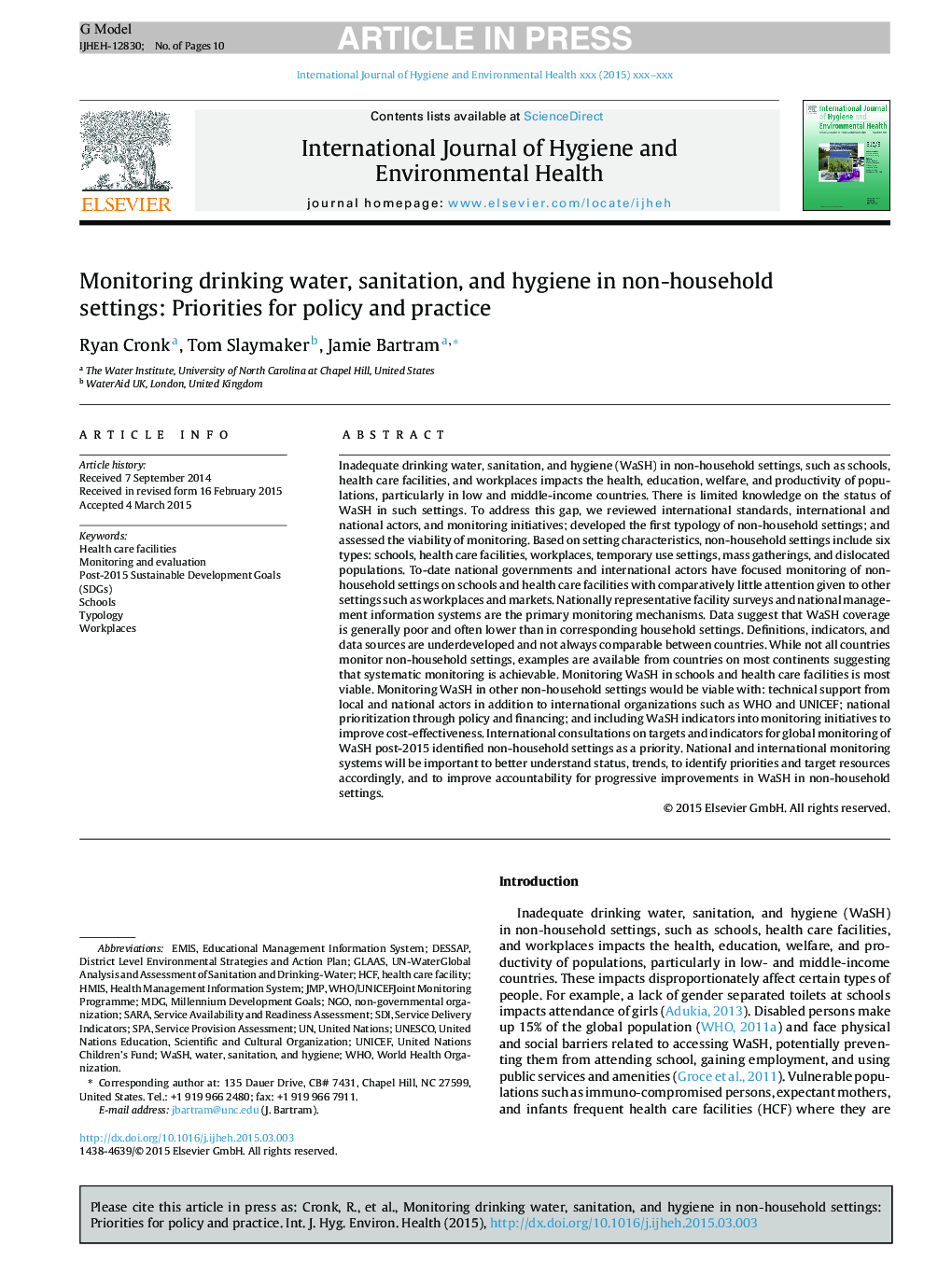| کد مقاله | کد نشریه | سال انتشار | مقاله انگلیسی | نسخه تمام متن |
|---|---|---|---|---|
| 5854571 | 1561886 | 2015 | 10 صفحه PDF | دانلود رایگان |
عنوان انگلیسی مقاله ISI
Monitoring drinking water, sanitation, and hygiene in non-household settings: Priorities for policy and practice
ترجمه فارسی عنوان
نظارت بر آب آشامیدنی، بهداشت و بهداشت در محیط های غیر خانگی: اولویت های سیاست و عمل
دانلود مقاله + سفارش ترجمه
دانلود مقاله ISI انگلیسی
رایگان برای ایرانیان
کلمات کلیدی
JMPHCFHMIsMDGEMISSDISPAHealth care facilities - امکانات بهداشتیMillennium Development Goals - اهداف توسعه هزارهHealth care facility - تسهیلات مراقبت های بهداشتیSARA - ساراWorld Health Organization - سازمان بهداشت جهانیNGO - سازمان غیر دولتیnon-governmental organization - سازمان غیر دولتیUnited Nations - سازمان مللHealth Management Information System - سیستم مدیریت اطلاعات بهداشتیWaSH - شستشوUnited Nations Children's Fund - صندوق کودکان سازمان ملل متحدWorkplaces - محل کارSchools - مدارسMonitoring and evaluation - نظارت و ارزیابیWHO - کهTypology - گونهشناسیUNESCO - یونسکوUNICEF - یونیسف
موضوعات مرتبط
علوم زیستی و بیوفناوری
علوم محیط زیست
بهداشت، سم شناسی و جهش زایی
چکیده انگلیسی
Inadequate drinking water, sanitation, and hygiene (WaSH) in non-household settings, such as schools, health care facilities, and workplaces impacts the health, education, welfare, and productivity of populations, particularly in low and middle-income countries. There is limited knowledge on the status of WaSH in such settings. To address this gap, we reviewed international standards, international and national actors, and monitoring initiatives; developed the first typology of non-household settings; and assessed the viability of monitoring. Based on setting characteristics, non-household settings include six types: schools, health care facilities, workplaces, temporary use settings, mass gatherings, and dislocated populations. To-date national governments and international actors have focused monitoring of non-household settings on schools and health care facilities with comparatively little attention given to other settings such as workplaces and markets. Nationally representative facility surveys and national management information systems are the primary monitoring mechanisms. Data suggest that WaSH coverage is generally poor and often lower than in corresponding household settings. Definitions, indicators, and data sources are underdeveloped and not always comparable between countries. While not all countries monitor non-household settings, examples are available from countries on most continents suggesting that systematic monitoring is achievable. Monitoring WaSH in schools and health care facilities is most viable. Monitoring WaSH in other non-household settings would be viable with: technical support from local and national actors in addition to international organizations such as WHO and UNICEF; national prioritization through policy and financing; and including WaSH indicators into monitoring initiatives to improve cost-effectiveness. International consultations on targets and indicators for global monitoring of WaSH post-2015 identified non-household settings as a priority. National and international monitoring systems will be important to better understand status, trends, to identify priorities and target resources accordingly, and to improve accountability for progressive improvements in WaSH in non-household settings.
ناشر
Database: Elsevier - ScienceDirect (ساینس دایرکت)
Journal: International Journal of Hygiene and Environmental Health - Volume 218, Issue 8, November 2015, Pages 694-703
Journal: International Journal of Hygiene and Environmental Health - Volume 218, Issue 8, November 2015, Pages 694-703
نویسندگان
Ryan Cronk, Tom Slaymaker, Jamie Bartram,
